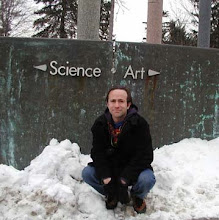The overview: “climate change presents very serious global risks and demands an urgent global response.”
From the outset of the Stern Review, I’m thinking of the mantra of the environmental movement “Think Globally, Act locally.” I connect it to the idea that small actions can have big impacts – in dynamical systems this is the “butterfly effect.” We can apply this to time – by acting today, in seemingly small ways, we can influence tomorrow in not so small ways. The premise here is that in order to counteract the catastrophe of our own making – we have to take such steps today.
The heart of the Stern Review is in the convergence of economics and ecology (as is reiterated by Sachs in his lecture), two things which are often at odds. But both stem from the Greek root “oikos” or house. Nomos=managing, hence economy is “household management.” Logia is study of, thus it’s the study of the house – or interrelationship of organisms and their environment. One more, ecosystem (house-system) – consists of everything living in the house and the house itself – all interdependent on one another. Thus, realizing our planet as an interdependent system, in order to care about either economics or ecology, we realize that we need to be concerned with both.
By mitigating (taking strong action to reduce emissions) now, Stern says, we can prevent huge future costs – economically and ecologically. Again, think local/global, butterflies – or consider, cleaning a small cut and putting a band-aid on it is a small cost, but it prevents infection, the treatment of which is expensive and threatening to your entire organism. Seeing the connections between things, between our system/planet as a whole is essential. If we wait to disaster strikes, it’s often too late – we have to amputate or worse… Systems of water and air flow throughout the planet like arteries connecting us as a whole. Literally, “we’re in the same boat brother.” Rocking one end, affects the other.
Again, global/local – act now or pay later…. As Stern writes, “Such a modeling framework has to take into account ethical judgments on the distribution of income and on how to treat future generations.” Our previous president dismissed his actions as being up to historians to judge. What if instead we think of the effect of our actions on future generations – to borrow the native American philosophy – think of the seventh generation. Thus the costs of mitigation today, pale in comparison to the costs of mitigation tomorrow, should we fail to do so today. Stern talks of social costs of carbon, or the real costs of things. What about a Styrofoam cup? Nearly free, yet a huge use of resources and landfill space. If we considered the real costs of everything we use and have to start paying this cost – our perspective shifts and our buying habits change. We’d buy things that lasted and wouldn’t leave behind toxic residue when they finally had to be put out to pasture.
The need for taking significant action now is presented here: “The current evidence suggests aiming for stabilization somewhere within the range of 450-550ppm CO2e. Anything higher would substantially increase the risks of very harmful impacts while reducing the costs of mitigation by comparatively little. Aiming for the lower end of this range would mean the costs of mitigation would be likely to rise rapidly. Anything lower would certainly impose very high adjustment costs in the near term for small gains and might not even be feasible, not least because of past delays in taking strong action.” That is, if we’re willing to pay a little today, we won’t be stuck with an unpayable bill tomorrow. And so with the stakes this high, perhaps the mantra stated at the outset shifts somewhat and becomes “think global, act global.” As Stern puts it, “A shared global perspective on the urgency of the problem and on the long-term goals for climate change policy, and an international approach based on multilateral frameworks and coordinated action, are essential to respond to the scale of the challenge.” We’ve got to get it together, together. “Above all, reducing the risks of climate change requires collective action. … Delay would be costly and dangerous.”
I looked briefly at some criticisms of the Stern Review. On the conservative side of things he was bashed for playing chicken little, while environmentalists say he hasn’t gone far enough. Overall it seems balanced to me, and lays out the enormity of issues in a way that speaks to people’s hearts and bottom line. Furthermore, as he puts it himself, even if the specifics are wrong, the risks are so great that, “Uncertainty is an argument for a more, not less, demanding goal, because of the size of the adverse climate-change impacts in the worst-case scenario.”
One more thing, as I typed this up, I happened upon an interview with James Lovelock – originator of the Gaia theory of the earth as an organism. Scarily, Lovelock suggests we may already be too late to avoid catastrophe. That said, Lovelock seems unconcerned, as from the view of the earth as organism, less people isn’t a bad thing. Read it here if you’re interested: http://www.newscientist.com/article/mg20126921.500-one-last-chance-to-save-mankind.html
Subscribe to:
Post Comments (Atom)

No comments:
Post a Comment